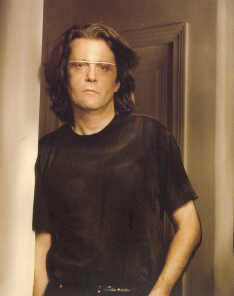

 |
 |
|
Pascal Dusapin Niobé (ou le Rocher de Sypile)  Music of Today: Queen Elizabeth Hall London, 15 Feb 2007, 6:00pm Claire Booth soprano [Presented by Julian Anderson in conversation with Pascal Dusapin] Because of teaching commitments, neither of those two was present, so this short opera/cantata (c. 40 mins) was introduced instead by Gillian Moore (Head of Contemporary Culture, SBC) who quizzed the conductor about this little-known (in UK) French composer, famous in his own culturally-far off land across the Channel. Niobé's only previous UK performance was at the Almeida Festival, during those halcyon times in the '80s when composers from abroad were generously featured. It did indeed bring Varese to mind (the instrumental scoring similar to that of Octandre) and also, very strongly, Xenakis's Oresteïa (also unforgettable since one of those Almeida Festivals concerts at Union Chapel in Islington). The event was billed as promising to be "one of the highlights of the London concert season". That is pushing it a bit, as it was a free pre-concert, convenient for commuters on the way home, preceding a sold-out and unrelated Rachmaninoff/Sibelius Philharmonia concert. Does the Philharmonia know the constitution of those who attend those Music of Today events? Familiar faces of London's contemporary music fraternity were conspicuously absent. Niobé's only previous UK performance was at the Almeida Festival, in those halcyon times in the '80s when composers from abroad were generously featured. Sadly, it has had to wait nearly a score of years to be heard by a new generation of listeners, and a few afficionados will be able to catch a late night broadcast on Radio 3 "at a future date". They will be fortunaate, because it is a powerful work, and received a quality performance which ought somehow to find its way into the now extensive Dusapin discography, of which a 1999 recording by Ensemble 2e2m is "currently unavailable". Niobé's was a cautionary tale about a mother of 14 who was mocking and disrespectful to a goddess Latona, who had only two; all 14 were slain in revenge. Niobe wept herself to death and became a "weeping stone". She was superbly personified by Claire Booth, making another triumph in a fortnight, following that when she stepped into a prestigious Wigmore Hall concert, learning and performing totally new repertoire with aplomb on only four hours notice ! For Niobé, Claire's experience specialising in Birtwistle stood her in good stead for coping with the asperities of Dusapin, whose ear-hurting instrumentation was for British listenera akin to that of Birtwistle and Maxwell Davies in their more radical earlier days. She was in commanding voice and stage presence and left a huge impression with the final haunting lament, and a certainty that she is on the brink of a significant career in new opera. Peter Grahame Woolf
Pascal Dusapin Faustus, the Last Night Georg Nigl, Urban Malmberg, Robert Worle, Jaco Huijpen, Caroline Stein Orchestra De L'Opera De Lyon/Jonathan Stockhammer naïve DVD M 0782177 [Berlin March 2006] Dusapin's 5th opera, newly released on DVD, is set to his own text based partly upon Marlowe's Tragicall History of Dr. Faustus, amongst many other sources. It is a tough nut in comparison with Niobé. Faustus, the Last Night is set in English, but you'd be hard put to it to follow it without the subititles provided, in English together with the usual other languages. Faustus, the Last Night is played by Lyons Opera in Berlin on a huge steeply sloping clock face, effectively lit and filmed to portray the anti-hero's fate from dusk to dawn in one night. Dusapin sees him as an archetypal malevolent figure representing, in today's terms, top politicians and industrialists wielding unlimited power. He is more sympathetic to Faustus's near double "Meph", who knows he has won and has a sense of humour. The other figures are allegorical and equally obscure. Others to appear are a blind angel, Sly, a drunken character in Shakespeare's "Taming of the Shrew," and Togod, a knowing fallen angel, his name an anagram of Beckett's Godot. Forget Goethe and all the operatic settings by Berlioz, Gounod and Boito; Dusapin's Faust sells his soul for "total power", says Dusapin, mentioning Bill Gates and George Bush, Osama bin Laden and Vladimir Putin, to get us onto his wavelength. It is a pessimistic quest, with emptiness its discovery after an hour and a half of philosophical exploraration, the bleak conclusion, with a balloon pricked and bursting, is that human life signifies emptiness; finally "there is ... Nothing ... nothing ... That's it ... That's right ... That's the way it is." The mood of incipient doom is carried by the orchestra and the perilous stage set; at times the singers have to clutch on to the hands of the clock and seem to be at risk of falling into the orchestra pit! There are but rare opportunities for lyrical singing and the whole is strenous for participants and listeners alike. Faustus, the Last Night will need several hearings to (hopefully) reveal its secrets. The booklet has on its back cover (shown above) illustrations from the many Dusapin recordings in the naïve catalogue; I recommend especially the CDs/DVD of his piano concerto À quia, with Ian Pace. Peter Grahame Woolf
|